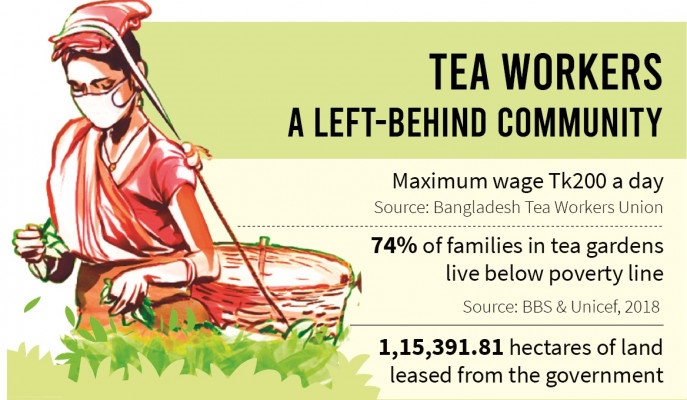
Improve workers’ life to revive tea export: Experts

Economists and experts have asked for increasing social protection for tea workers to restore the tea industry to a strong position on the list of export-oriented sectors.
They recommended that the government formulate a plan attaching priority to issues like education and health for the tea garden labourers and their children.
Tea garden workers were once considered slaves, but even though that situation has changed, these workers are still socially isolated, Economist Professor Wahiduddin Mahmud said in a webinar entitled "Tea workers of Bangladesh: challenges and accountability of actors" organised on the occasion of International Tea Day on Friday.
"We have to create opportunities for them. Aspiration must be awakened in them so that they can dream of becoming accomplished in society. To this end, a congenial environment must be created for their education. The scope of social protection should be increased," Prof Wahiduddin said.
Concerted efforts by the government, the owners and NGOs will yield good results in this regard, he observed.
"But, now we have to think about the whole industry. We have to think about how the productivity of this industry can be increased so that the industry can have a greater share of the international tea market apart from that of the domestic market," he added.
Dr Hossain Zillur Rahman, executive chairman of the Power and Participation Research Centre (PPRC), said tea was once at the forefront of our export products but it has lost that position.
He, however, observed that the domestic market has been strong, which is a very good thing.
"But, since there is a good market for this product outside the country, exports will increase again if workers are protected by giving importance to compliance issues. That will add pace to our overall economic growth," Dr Hossain Zillur said.
Tea workers have now been brought under civic amenities, but their basic needs like education and health have not been fully ensured, he pointed out. "For this, we have to give importance to accurate statistics. The solution will come, if all the stakeholders plan together on the basis of factual information."
In the keynote presentation, Philip Gain, director of the Society for Environment and Human Development (SEHD), highlighted various sorts of discrimination tea workers in the country face.
When the number of casual leaves in other industries is 10 days, that is not the case in the tea industry, he said.
There is also inequality in earned leaves, he said, adding that workers in other industries receive one day of earned leave every 18 work days, but for tea workers it is one day for every 22 days of work.
He went on to say that recruitments in the sector are not done through issuing appointment letters, flouting the labour law.
Temporary workers usually do not receive full rations, medical care and paid leave. While companies are supposed to distribute 5% of their profits among workers, they seldom give it.
Workers receive a small pension at the end of their employment, but do not receive gratuity, Philip further added.
Citing a 2018 survey by the Bangladesh Bureau of Statistics (BBS) and Unicef, he said 74% of tea garden families lived below the poverty line. But in 2016, this rate was 24% at the national level.
He also mentioned that tea workers are deprived of education and health.
He said as per the 2004 census, the number of primary schools in 156 tea gardens in the country was 188. The number is 273, according to the statistics of 2019.
In 2014, the number of primary schools in tea gardens reached 1,054. At that time, non-government organisation Brac alone operated 789 primary schools in tea gardens but those are closed at present.
Philip demanded that an adequate number of quality government schools be established and education opportunities be ensured there through the introduction of a quota system for the workers.
Professor Farid Uddin Ahmed, vice chancellor of Shahjalal University of Science and Technology (SUST), told the event, "As the first university in the country, we have introduced a quota to build tea workers' children as first-class citizens. At present, 12 such students are studying in our university."
Other local institutions in Sylhet may follow suit, he said. He, however, advised to focus on value addition to increase the tea sector's reach in the international market.
Addressing the programme as chief guest, KM Abdus Salam, secretary to the Ministry of Labour and Employment, said the government's social safety net programme is giving priority to improving the quality of life of tea workers. "We want to take up a 5-year plan to this end. This requires your participation."
Khushi Kabir, coordinator of Nijera Kori, said the maternity leave for women tea workers is 16 weeks, but it is 24 wee
Editor & Publisher: S. M. Mesbah Uddin
Published by the Editor from House-45,
Road-3, Section-12, Pallabi, Mirpur
Dhaka-1216, Bangladesh
Call: +01713180024 & 0167 538 3357
News & Commercial Office :
Phone: 096 9612 7234 & 096 1175 5298
e-mail: financialpostbd@gmail.com
HAC & Marketing (Advertisement)
Call: 01616 521 297
e-mail: tdfpad@gmail.com